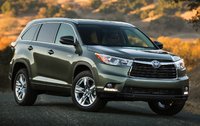how best to determine what to pay for a used car ?
Asked by charlieth0 Jan 24, 2019 at 12:40 PM about the 2017 Toyota Highlander Hybrid Platinum
Question type: Shopping & Pricing
i recently saw a listing for a used Highlander Limited (hybrid) sold for $41K,
i am curious how that is "fair pricing" when new 2018 are showing as $46k
average fair pricing with range as low as $44,650 for a PLATINUM which
would have as standard all the major options available. KBB fair market
range for new LIMITED is $41.9k to $44.4K do you have any good artcles
on how pricing between used and new changes so i can be a smarter used
car shopper?
3 Answers
This is why some cars are not worth buying used. I see dealers asking more than new prices for used cars. Clearly you can always offer less than asking price when shopping for a used car.
shoprightchoice answered 5 years ago
The best way to determine the value of a vehicle is to search the marketing websites where vehicles are being offered for sale. Book values can vary but the market value can best be determined with a search on sites like autotrader.com. I suggest doing a nationwide search so you include every sample in the country, select an "up to" mileage so you get relevant search results, and then sort your results by lowest price first. For example, if you're looking for a 2014 Mercedes-Benz E350 under 30k miles, you'll get an idea of where the prices start and work your way up. The variables to factor are: 1) history- accidents, service records, number of owners, state of ownership (was it in Alaska or Florida?). title status (clean, rebuilt, salvage, flood) 2) color- less common colors on most cars are worth less (orange versus white) 3) options- what equipment or upgrades does the car have? navigation, backup camera, leather, sunroof, etc. autoblog.com is a great source to price cars of any year where you can actually see all options available and the msrp of each one 4) mileage- mileage obviously makes a big difference in the value These variables can make a huge difference in pricing. A car with an accident will almost certainly be worth a minimum of $1,000 less. A car with a salvage title will be worth at least 40% less than a clean title vehicle. A purple car may be worth $1,000 less than a red one. using the search method above will give you a good idea of the market prices for cars.
shoprightchoice answered 5 years ago
With over 25 years in the car business including 15 working for the largest auto auction company in the world as well as 10 years in the wholesale and retail I assure you that the "book" values can be WAY off. For example, yesterday we just sold a 2005 SL500 with 65k miles, clean Carfax, Florida car, and in exceptionally clean condition, The "book values" were in the mid to high $15k range, We sold it for $12,950. We currently have a 2007 Jeep Grand Cherokee Laredo 2wd that we took on trade. The KBB Fair Purchase Price is $5,689, NADA retail is $6,575, and the Carfax value is $5,450. Our price is $3,550. We just sold a 2013 ML350 Bluetec for $21,950- KBB is $24,591. We have a 2014 E350 sedan with just under 25k miles, clean Carfax, Florida car and $7k in options for $23,950. The NADA value is $26,925. The book values can be way off. If you do the nationwide search as I suggest with your mileage criteria and sort the results by the lowest price first, you get a complete picture of what the actual market is for a specific car. Book values don't factor accidents, condition, service history, state of ownership, paintwork, title status, number of owners, etc. They're ok as a general guide but the market determines the true value. A car (like a baseball card, bottle of vintage wine, or a tv) is worth what someone is willing to pay for it. When gas prices spike to $5 a gallon, watch the market on full size SUV's and hybrids, not what the "book value" says. Truecar, KBB, NADA, and the rest are an aggregate and certainly more effective tools with an average mileage, 1 to 3 year old car but still not nearly the perfect science it's made out to be. Bottom line, do your research. Look at the book values but focus on what's available on the market while comparing history, mileage, options, condition, title, Carfax, state of ownership, number of owners, etc.
